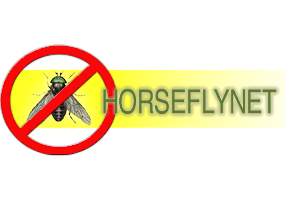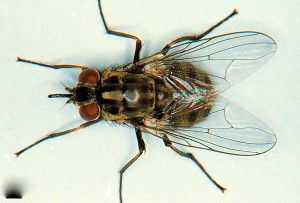-
Anthropods can cost the horse industry millions just by the nature that they can damage the horse directly or indirectly. Very simply they suck blood, feed on mucous discharges from the horses and spread disease. They can also cause digestive interference which results in poor growth of the horse. By taking the time to understand the biology, life history and habits of the pest species. They attack horses but we can, as horse owners, find the best way to establish a prevention management and control program.
Important to understand is that the fly has four stages: egg, larva, pupa and adult.
In the barn we commonly find two species the House Fly (Musca domestica)
and the Stable Fly(Stomoxys calcitrans). The House Fly is a concern for both horses and people. Not being obligate parasites they can live away from a host animal. When they alight on a surface they will deposit a droplet of vomit and a speck of fecal material. It is through this process that a large population can transmit harmful microorganisms.. In addition the adult House Fly can act as a intermediate hosts for a stomach worm of horses called Habronema. Most barn owners have had evidence of the fly specks in their barn and always are conscious of the annoying flight of these pests.
To rid ourselves of this species we need to consider where they breed. The egg is deposited in organic matter. Horse dung is the perfect medium but garbage, straw, hay and greenchop can also draw the House Fly. The the cycle from egg to larva to fly is relatively short. In the summer that is only 1-2 weeks. Their population can advance quickly and become the aggravation of horses around stables.
Controlling the House Fly in essence is controlling the breeding material, controlling the moisture in potential breeding material and mechanical control and the judicial use of insecticides. We hate to admit the last one but lets face it a fly swatter and fly tape(mechanical control) are ineffective and a nuisance in the barn. Removing all horse dung, covering it with a net and mulching this with all the old straw and hay is the best way to reduce the house flies breeding cycle. Next blog the Stable Fly discussed.
copyright Horse Fly Net® 2012
Arthrodpods Better Known as Flies
Call Us at (910) 725-2115 or Email Us at info@horseflynet.com
Horse Fly Net
This see-through breathable screen will last for years. It is made of polyester vinyl coated and heat sealed on the edges with brass grommets about every foot. It has no chemicals added. Our HorseFlyNets only cost approximately $2.00 a square foot for smaller sizes and less for larger. Our product is woven and manufactured in the USA.
HorseFlyNet®
Southern Pines, NC
(910) 725-2115
info@horseflynet.com


